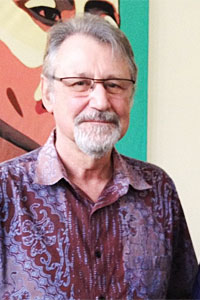
Myanmar's military chief Sen Gen Min Aung Hlaing and the country's top civilian leader, Aung San Suu Kyi -- the state counsellor and foreign minister -- have held a series of secret meetings over the last month or so. "These were unpublicised meetings, rather than secret meetings," according to senior members of the governing party, the National League for Democracy (NLD).
The two had not had face-to-face contact since at least last October according to military sources close to the army boss. The relationship between the two has deteriorated since then, after Min Aung Hlaing visited China on a hastily arranged trip, according to a source close to the Lady -- as she is known inside the country, particularly within military circles.
Since then the only direct contact between the military top command and the country's civilian government has been through the Defence Minister Sein Win -- still a serving officer and one of the three ministers appointed by the army chief, under the constitution.
But in recent weeks, with the situation in Arakan worsening, amid increased international criticism -- heightened in the past few weeks with a stern rebuke from the United Nations human rights' envoy Yanghee Lee, and preparations for the forthcoming second round of the Union Peace Conference -- dubbed the 21st Century Panglong, after the historic meeting between Gen Aung San and some ethnic leaders in 1947, which committed the country to a federal state -- gathering pace, both leaders have realised the need to work more closely together.
"Both sides understand they need each other, even if they don't like or trust each other," a retired, senior military officer, with close links to Min Aung Hlaing told the Bangkok Post on condition of anonymity. Although talks have been held several times last month between the two, growing security concerns in the wake of the assassination of the prominent Muslim lawyer and legal adviser to the NLD, Ko Ni, has increased the imperative for closer cooperation between the government and the army on security matters.

Larry Jagan is a Myanmar specialist and former BBC World Service News Editor for the region.
The situation in Rakhine and particularly the stalled peace process prompted the original attempt to mend the growing rift between the country's top civilian and military leaders. But it was problems in the peace process, and what the army chief took to be the Lady's lack of transparency on the issue, that first led to the deterioration in their relationship, according to informed military sources.
At the heart of the issue was the role of China, which behind the scenes was encouraging some of the ethnic groups to participate in the first round of the peace conference in August last year. There was no doubt that after Aung San Suu Kyi's visit to China in August, the two main pro-China groups -- the Wa and Mongla, who are based along the border in Shan state -- agreed to participate.
But still an issue was the participation of the three "renegade" groups -- the Arakan Army (AA), the Kokang or Myanmar National Democratic Alliance Army (MNDAA), and the Palaung or Ta'ang National Liberation Army (TNLA). The military were opposed to their participation, unless they laid down their arms. The other ethnic groups insisted they should be involved in the conference if the peace process was to be truly inclusive.
A compromise was sought whereby the three rebel groups would sign an undertaking to stop fighting and lay down their arms in the future and abide by the political process. Aung San Suu Kyi, according to diplomatic sources, pressed the Chinese hard to get their allies the Wa to agree to the compromise and convince the three to sign.
The Lady returned from Beijing convinced that the Chinese had promised to comply -- and told the army chief that there would be good news on this matter, shortly before the conference commenced. As it turned out the three rebel groups reneged and did not sign the proposed undertaking.
But then Min Aung Hlaing was told on his visit to China in October that Beijing had promised no such thing, but had agreed to press the Wa to act -- they were not in a position to issue orders to the Wa, according to the Chinese side. For his part, according to former military sources, the army chief felt the Lady had misled him, and it made him more distrustful.
For her part, Aung San Suu Kyi appears to have bent over backwards to accommodate the army. She has accepted their version of events in Rakhine and in the peace process. She was informed beforehand that the military planned an intensive military campaign to force the Kachin Independence Organisation to sign the NCA. Defence Minister Sein Win even managed to get her to sign the orders, according to military sources.
At the moment she also plans to proceed with the peace conference with only those groups that have signed the NCA -- and effectively exclude the others. This is something the military have been insisting on.
But the situation in Rakhine, and the growing allegations of military atrocities there, is more problematic for Aung San Suu Kyi, and will increasingly strain her relations with the army commander. So far she has been muted in her comments on the latest UN report, which suggested the situation there is akin to "crimes against humanity".
In December when she met her fellow foreign ministers from the other Asean countries to brief them on the situation there, she acknowledged that there may have been incidents of human rights violations.
She told them that she understood she had to reign in the military, but did not know how, according to senior diplomatic sources in the region.
So there is little doubt that Aung San Suu Kyi and the commander-in-chief have much to talk about. Most analysts believe that a better understanding between them can only help the country move forward.
